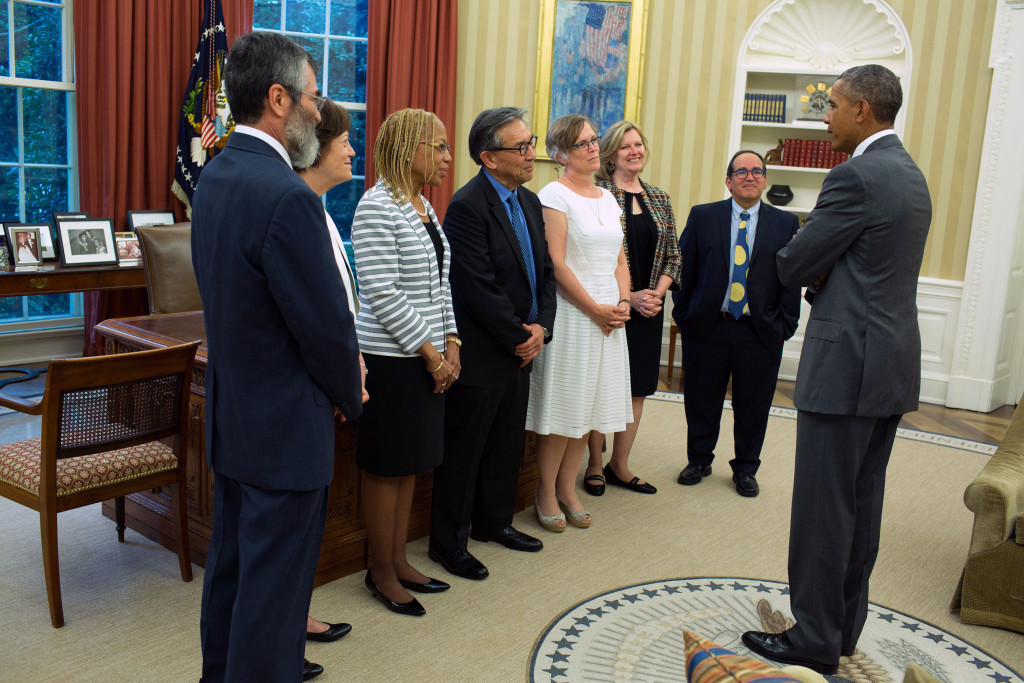Dean for diversity initiatives was one of 15 honored for her dedication to mentoring students studying science, mathematics, and engineering.

“Professors may impart subject-area knowledge to their students, but it is mentors like Beth that set students on a path, work tirelessly to ensure that they thrive, and are ultimately retained and graduated by the University,” says Amanda Mack ’08, a science teacher in Massachusetts, who adds that Olivares encouraged her and gave her the confidence to seek out prestigious summer research opportunities as an undergraduate.
Olivares was honored Tuesday in a U.S. presidential ceremony administered by the National Science Foundation for the impact she’s had on young men and women she’s worked with throughout her tenure at Rochester. She received the Presidential Award for Excellence in Science, Mathematics, and Engineering Mentoring, an honor awarded by the White House to individuals and organizations to recognize the crucial role that mentoring plays in the academic and personal development of students studying science and engineering—particularly those who belong to groups that are underrepresented in these fields.
“I and the other awardees spent two days in substantive, intense, and wide-ranging discussions with high level White House and National Science Foundation staff, providing guidance on ways to revise our national approaches to STEM education and practice that we believe will result in sustained increases in the participation of underrepresented minority, women, and disabled young people, who are still too often absent from our labs, classrooms, and innovation spaces,” Olivares said. “Yet on the same day I was honored to meet with President Obama in the Oval Office, the nation lost nine incredible black citizens and role models to unfettered hatred fueled by racism.
“As university educators, research scientists, and intellectual leaders, we have a serious role to play in addressing intolerance of all kinds. My work, and that of my fellow awardees, is proof that positive change can happen. The challenge now is to galvanize leaders of all ages to join us in these efforts.”
Olivares and the other recipients received their awards at a ceremony Tuesday in Washington, D.C. Award winners also receive awards of $10,000 from the NSF.
Olivares and the staff of the Kearns Center have built a national model for supporting low-income, first-generation, and underrepresented students.
Olivares, who joined the University in 1994, has expanded the center, developing educational pipeline programs that work with students from middle school through the doctoral degree. In the past decade, the center has received more than $10 million in external support for its various programs. More than 1,000 high school, undergraduate, and graduate students are served by the center’s programs, which include Upward Bound, Upward Bound Math/Science, two College Prep Centers located in the Rochester City School District, and the Ronald E. McNair Post-Baccalaureate Achievement Program. The center also houses the Xerox Scholars program for engineering students. In addition to the academic services it provides, the center coordinates graduate student recruitment and retention efforts.
“Her work at the University exemplifies our vision that education is transformative for individuals, communities, and for society,” says Provost Peter Lennie, the Robert L. and Mary L. Sproull Dean of the Faculty of Arts, Sciences & Engineering.
Olivares has been an active member of several professional organizations. She also served on the board of directors of the Council for Opportunity in Education, a national advocacy council that works to increase educational opportunities for low-income students. Through the organization, Olivares spoke at the inaugural meeting of the Congressional TRIO Caucus in 2010, advocating for the McNair Program. On several occasions, she has met with White House education advisors about the need for increased educational opportunities for low-income individuals.
